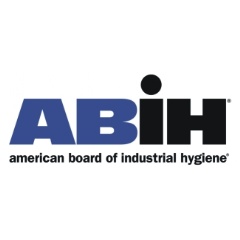Protecting Workers from Exposure to Engineered Nanoparticles
The American Board of Industrial Hygiene® (ABIH®) reminds industry and workers of the need to prevent occupational exposure to nanomaterials.
Certified Industrial Hygienists (CIHs) are uniquely qualified to help prevent worker exposure to nanomaterials due to their training and experience in air sampling, engineering controls/ventilation, work environments, personal protective equipment (PPE), industrial processes, and health risk analysis and hazard communications.
Nanotechnology, as defined by the National Institute for Occupational Safety and Health (NIOSH), is the manipulation of matter on a near-atomic scale to produce new structures, materials and devices. This technology promises scientific advancement in sectors including medicine, consumer products, energy, materials and manufacturing.
According to the Occupational Safety & Health Administration (OSHA), engineered nanoscale materials or nanomaterials are materials that have been purposefully manufactured, synthesized or manipulated to have a size with at least one dimension in the range of approximately 1 to 100 nanometers and that exhibit unique properties determined by their size. In recent years there has been a growing shift of nanotechnology applications from research laboratories to manufacturing settings and into industrial and consumer products. Occupational exposure to these materials is of concern because nanomaterials begin to exhibit unique properties at this near-atomic size that affect physical, chemical and biological behavior. People working in industries that utilize nanomaterials have the potential to be exposed to these engineered materials through inhalation, skin contact or ingestion. NIOSH states that occupational health risks associated with manufacturing and using nanomaterials are not yet clearly understood.
“Last year, the American Industrial Hygiene Association’s Nanotechnology Working Group released a fact sheet about personal protective equipment for engineered nanoparticles,” said Susan Ripple, CIH® and Chair of ABIH®. “The document recommends a combination of controls to protect workers from exposure risks. They include the elimination or reduction of hazard/exposure, engineering controls, administrative controls and personal protective equipment as the last line of defense.”
Certified Industrial Hygienists (CIHs) are uniquely qualified to help prevent worker exposure to nanomaterials due to their training and experience in air sampling, engineering controls/ventilation, work environments, personal protective equipment (PPE), industrial processes, and health risk analysis and hazard communications. These and other core competencies of the CIH® program can be instrumental in minimizing exposure to nanomaterials and other potential occupational exposure risks.
To learn more about the American Board of Industrial Hygiene®, Certified Industrial Hygienist® credential or to locate a CIH® to perform industrial hygiene services, please visit www.ABIH.org, email abih@ABIH.org or call (517) 321-2638.
About the American Board of Industrial Hygiene ®
Since 1960, ABIH®, a not-for-profit corporation, has been the world’s largest organization for certifying professionals in the practice of industrial hygiene. ABIH® is the premier credentialing body responsible for ensuring high-quality certification including education, experience, examination, certification maintenance and ethics enforcement. Currently, more than 6800 people in 31 countries are certified to use the CIH® designation.
( Press Release Image: https://photos.webwire.com/prmedia/12710/201978/201978-1.jpg )
WebWireID201978
- Contact Information
- Paul Cochrane
- President
- Cochrane & Associates, LLC
- Contact via E-mail
This news content may be integrated into any legitimate news gathering and publishing effort. Linking is permitted.
News Release Distribution and Press Release Distribution Services Provided by WebWire.
